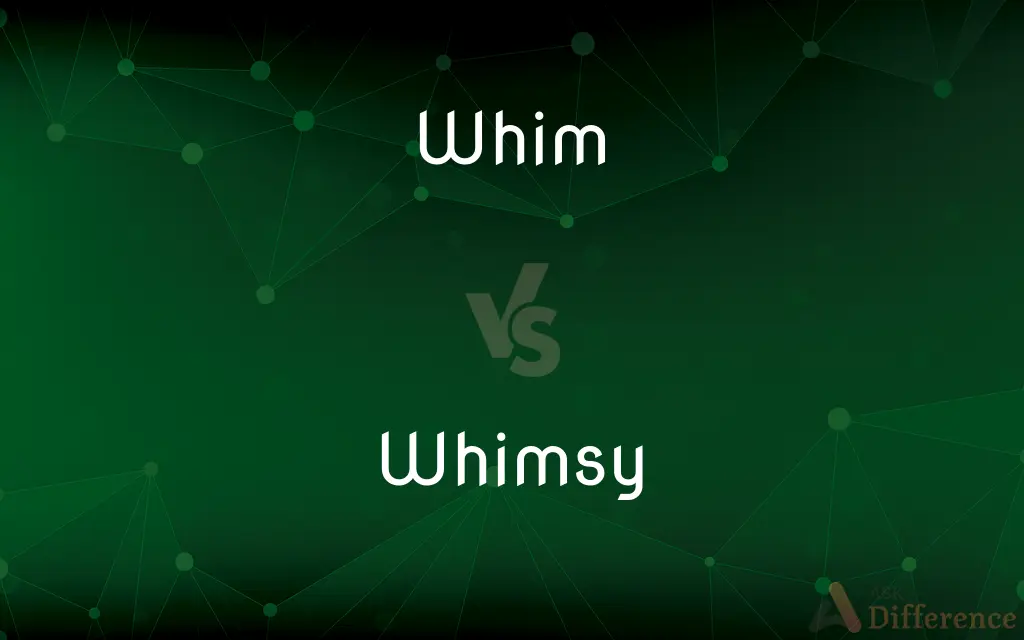Whim vs. Whimsy — What's the Difference?
By Tayyaba Rehman & Maham Liaqat — Updated on March 27, 2024
Whim implies a sudden or capricious idea or desire, while whimsy denotes playfulness or an odd or fanciful notion.

Difference Between Whim and Whimsy
Table of Contents
ADVERTISEMENT
Key Differences
A whim is often understood as a sudden or impulsive decision, idea, or desire that arises without much forethought, emphasizing the capricious nature of human decision-making. It reflects a momentary inclination towards something that might not have a deep rationale behind it. Whimsy, on the other hand, embodies a broader concept of playfulness, creativity, or fancifulness in thought or action. It suggests a light-hearted or quirky approach to things, often associated with imagination and a sense of wonder.
While a whim can lead someone to act unexpectedly, driven by a fleeting desire or impulse, whimsy influences one’s perspective or creations, infusing them with a distinctive charm or fancifulness. For instance, purchasing a bright, unconventional piece of furniture on a whim speaks to a spontaneous decision, whereas decorating a room with a whimsical theme reflects a deliberate choice to embrace playfulness and creativity.
Whim often carries a personal connotation, pointing to individual impulses or desires that prompt specific actions or decisions. Whimsy, however, can be seen in broader contexts, such as art, literature, and design, where it denotes a style or quality that breaks from the mundane or conventional through imaginative and fanciful touches.
The implications of acting on a whim versus embracing whimsy differ significantly. Acting on a whim might lead to unpredictable or varied outcomes, some of which may be regretted later. Embracing whimsy, however, is usually a conscious choice to incorporate or appreciate creativity and oddity, which can enhance one’s life or work with a sense of uniqueness and enjoyment.
In terms of usage, "whim" can be seen as more fleeting and focused on specific instances or decisions, whereas "whimsy" has a more enduring and pervasive quality, influencing not just individual choices but also styles, themes, and perceptions over time.
ADVERTISEMENT
Comparison Chart
Definition
A sudden or capricious idea or desire.
Playfulness or an odd or fanciful notion.
Connotation
Impulsive, fleeting.
Creative, imaginative, playful.
Application
Individual decisions or actions.
Themes, styles, perspectives in various domains.
Implications
Can lead to unpredictable outcomes.
Enhances creativity and enjoyment.
Duration
Momentary, transient.
Enduring, pervasive.
Compare with Definitions
Whim
An immediate, often unreflective urge to act.
On a whim, he bought a ticket to Rome for the weekend.
Whimsy
An imaginative or quirky idea.
Her stories are full of whimsy, populated with talking animals and magical forests.
Whim
A sudden change of mood or behavior without obvious reason.
The decision to rearrange the living room was made on a whim.
Whimsy
Quality of being lighthearted and playful.
The garden was designed with a sense of whimsy, featuring fairy statues and winding paths.
Whim
A sudden desire or inclination.
She decided to dye her hair pink on a whim.
Whimsy
A quality of being strange or peculiar in a charming way.
The whimsy of her artwork adds a delightful quirkiness to the gallery.
Whim
An action taken based on spontaneous desire.
Their whimsical decision to adopt a pet changed their lives.
Whimsy
A unique, unconventional approach.
His whimsy in dressing often includes colorful socks and vintage hats.
Whim
An abrupt desire leading to immediate action.
He felt a whim to call an old friend out of the blue.
Whimsy
Playfully quaint or fanciful behaviour or humour
The film is an awkward blend of whimsy and moralizing
Whim
A sudden or capricious idea; a fancy
“More than five hundred of these men would never see another sunset, yet a holiday atmosphere prevailed.
They joked with each other as they marched, dropping out again for blackberries when the whim struck them, despite stern new orders to the contrary” (William Marvel).
Whimsy
A whim
A clean slate on which to enter information in the form that suits your whimsy
Whim
Arbitrary thought or impulse
“I dreamed of having the golden flesh, the huge muscles of half-naked gods and goddesses who did whatever they wanted to do, ruling the universe according to their whims” (John Edgar Wideman).
Whimsy
An unusual, unexpected, or fanciful idea; a whim.
Whim
A vertical horse-powered drum used as a hoist in a mine.
Whimsy
Quaint, fanciful, or playful humor
Stories full of whimsy.
Whim
A fanciful impulse, or sudden change of idea.
Whimsy
A quaint and fanciful idea; a whim; playfully odd behaviour.
Whim
(mining) A large capstan or vertical drum turned by horse power or steam power, for raising ore or water, etc., from mines, or for other purposes
Whimsy
An impulsive, illogical or capricious character.
Whim
A bird, the Eurasian wigeon.
Whimsy
(mining) A whim capstan or vertical drum.
Whim
To be seized with a whim; to be capricious.
Whimsy
A jigsaw puzzle piece that has been cut into a recognizable shape, as if on a whim; often the shape is representative of the theme of the image used for the puzzle.
Whim
The European widgeon.
Whimsy
(transitive) To fill with whimsies or whims; to make fantastic; to craze.
Whim
A sudden turn or start of the mind; a temporary eccentricity; a freak; a fancy; a capricious notion; a humor; a caprice.
Let every man enjoy his whim.
Whimsy
A whimsey.
Whim
A large capstan or vertical drum turned by horse power or steam power, for raising ore or water, etc., from mines, or for other purposes; - called also whim gin, and whimsey.
Whimsy
An odd or fanciful or capricious idea;
The theatrical notion of disguise is associated with disaster in his stories
He had a whimsy about flying to the moon
Whimsy can be humorous to someone with time to enjoy it
Whim
To be subject to, or indulge in, whims; to be whimsical, giddy, or freakish.
Whimsy
The trait of acting unpredictably and more from whim or caprice than from reason or judgment;
I despair at the flightiness and whimsicality of my memory
Whim
A sudden desire;
He bought it on an impulse
Whim
An odd or fanciful or capricious idea;
The theatrical notion of disguise is associated with disaster in his stories
He had a whimsy about flying to the moon
Whimsy can be humorous to someone with time to enjoy it
Common Curiosities
Is whimsy always positive?
While whimsy is generally viewed positively as it relates to creativity and playfulness, its reception can vary depending on personal tastes and contexts.
How can whimsy be incorporated into daily life?
Whimsy can be incorporated through creative expression, playful decor, or adopting a lighthearted approach to tasks and interactions.
Does whimsy have a place in professional environments?
Yes, whimsy can foster creativity and innovation, making it valuable in professions that benefit from unconventional thinking and problem-solving.
Is there a cultural aspect to whimsy?
Yes, what is considered whimsical can vary by culture, as it is influenced by societal norms and perceptions of creativity and playfulness.
How do I use "whim" and "whimsy" correctly in a sentence?
Use "whim" to describe a sudden or impulsive action or decision, and "whimsy" to denote an element of playfulness or creativity.
Can a whim lead to whimsy?
Yes, a spontaneous decision (a whim) can sometimes lead to a creative or fanciful outcome (whimsy).
Is it common to regret acting on a whim?
While not always, acting on a whim can lead to regret if the decision was made impulsively without considering the consequences.
Can whimsy be planned or is it always spontaneous?
Unlike whims, which are inherently spontaneous, whimsy can be both a deliberate choice and a natural inclination towards playfulness and creativity.
Can a person be described as whimsical?
Yes, describing someone as whimsical suggests they have a playful or fanciful nature, often reflected in their behavior or creations.
How do "whim" and "whimsy" differ in their impact on creativity?
A whim can spark a creative process by breaking routine, while whimsy can be a sustained source of inspiration and innovation in creative endeavors.
Share Your Discovery

Previous Comparison
Calumny vs. Slander
Next Comparison
Forward vs. ForwardsAuthor Spotlight
Written by
Tayyaba RehmanTayyaba Rehman is a distinguished writer, currently serving as a primary contributor to askdifference.com. As a researcher in semantics and etymology, Tayyaba's passion for the complexity of languages and their distinctions has found a perfect home on the platform. Tayyaba delves into the intricacies of language, distinguishing between commonly confused words and phrases, thereby providing clarity for readers worldwide.
Co-written by
Maham Liaqat












































